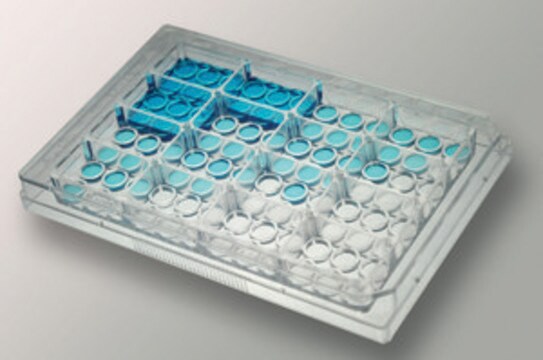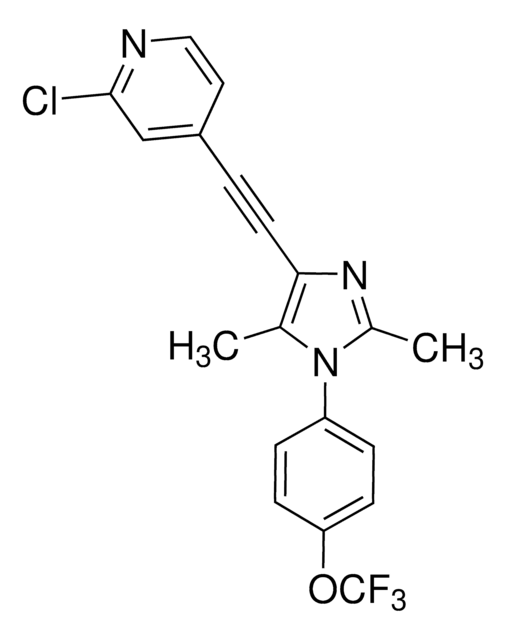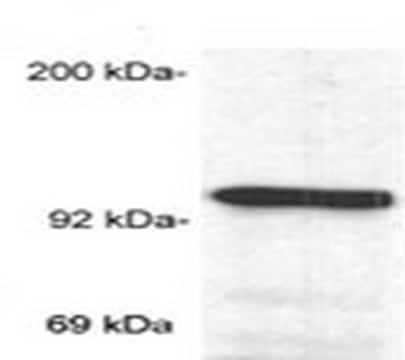HTS158M
ChemiSCREEN Membrane Preparation Recombinant Human α1B Adrenergic Receptor
Human alpha1B GPCR membrane preparation for Radioligand binding Assays & GTPγS binding.
About This Item
Recommended Products
biological source
human
Quality Level
recombinant
expressed in Chem-1 cells
manufacturer/tradename
ChemiScreen
Chemicon®
technique(s)
ligand binding assay: suitable (GTPγS)
radioligand binding assay (RLBA): suitable
NCBI accession no.
UniProt accession no.
shipped in
dry ice
General description
Application
Biochem/physiol Actions
Quality
| 5 µg/well | |
|---|---|
| Signal:Background | 11.8 |
| Specific Binding (cpm) | 1171 |
SPECIFICATIONS: 1 unit = 5 µg membrane preparation
Bmax for [3H]-Prazosin binding: 12.9 pmol/mg protein
Kd ffor [3H]-Prazosin binding: ~0.8 nM
Specifications
RECOMMENDED ASSAY CONDITIONS: Membranes are mixed with radioactive ligand and unlabeled competitor (see Figures 1 and 2 for concentrations tested) in binding buffer in a nonbinding 96-well plate, and incubated for 1-2 h. Prior to filtration, an FC 96-well harvest plate (Millipore cat. # MAHF C1H) is coated with 0.33% polyethyleneimine for 30 min, then washed with 50mM Tris, pH 7.4. Binding reaction is transferred to the filter plate, and washed 3 times (1 mL per well per wash) with Wash Buffer. The plate is dried and counted.
Binding buffer: 50 mM Tris, pH 7.4, 10 mM MgCl2, 1 mM EDTA, filtered and stored at 4°C
Radioligand: [3H]-Prazosin. (Perkin Elmer # NET823)
Wash Buffer: 50 mM Tris, pH 7.4, 500mM NaCl . 0.1% BSA filtered and stored at 4°C.
One package contains enough membranes for at least 200 assays (units), where a unit is the amount of membrane that will yield greater than 5-fold signal:background with 3H labeled Prazosin at 1nM
Physical form
Packaging method: Membranes protein were adjusted to 1 mg/ml in 1 ml packaging buffer, rapidly frozen, and stored at -80°C
Storage and Stability
Legal Information
Disclaimer
Storage Class Code
12 - Non Combustible Liquids
WGK
WGK 2
Flash Point(F)
Not applicable
Flash Point(C)
Not applicable
Regulatory Listings
Regulatory Listings are mainly provided for chemical products. Only limited information can be provided here for non-chemical products. No entry means none of the components are listed. It is the user’s obligation to ensure the safe and legal use of the product.
JAN Code
HTS158M:
Certificates of Analysis (COA)
Search for Certificates of Analysis (COA) by entering the products Lot/Batch Number. Lot and Batch Numbers can be found on a product’s label following the words ‘Lot’ or ‘Batch’.
Already Own This Product?
Find documentation for the products that you have recently purchased in the Document Library.
Our team of scientists has experience in all areas of research including Life Science, Material Science, Chemical Synthesis, Chromatography, Analytical and many others.
Contact Technical Service








